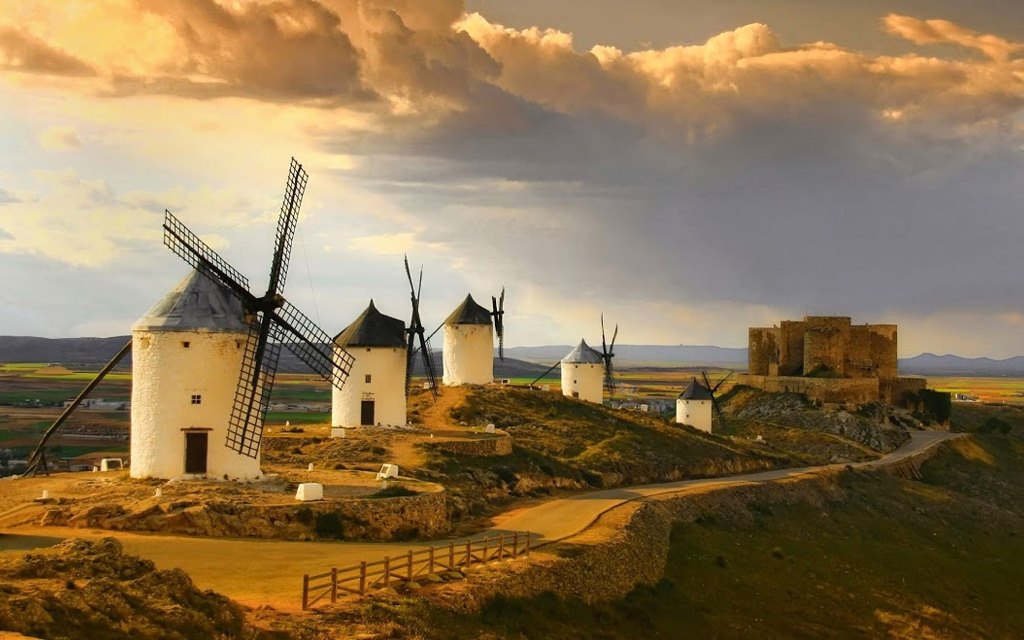Windmill Song
Alone it shudders on a hill,
Defiant in the wind.
A strong south gale could topple it,
A hard rain do it in.
Too many years its silver blades
Whirled in the morning breeze
While spinning far across the plains
A song it spun with ease.
Those years exacted quite a toll,
Yet still this relic stands,
To creak and squeak its timeless tune
Across now barren lands.
The melody remains unchanged,
But to a slower beat;
The cadence of a world gone by,
Its time not to repeat.
Hemidemisemiquaver
Among life’s puzzlements I know
one runs the gamut head to toe.
How such a thing was first perceived
is not so easily believed…
For there’s a note of music played
so rapidly it’s oft delayed
by virtuosos known to savor
hemidemisemiquaver.
It’s half a half a half a half
of half a note upon the staff;
one sixty-fourth of what we call
a whole note, if a note at all.
Don’t ask of me how this can be
a part of musicality;
for I don’t play and I don’t favor
hemidemisemiquaver.
Second Soprano Lament
Second soprano Gail was there
but, like her part, obscure;
with flaccid hair and flesh to spare,
yet with a voice so pure
that when I heard her sing one time
my breath was whisked away.
She languished as if not to care
behind her section’s leader,
Miss Dot McGuire, who ruled the choir
with first soprano meter,
leading the ladies as they chimed
in concert with her sway.
Gail on the second row remained
as Dot’s solos ascended
on soaring strains of high refrains
unfettered and unending,
and with auspicious confidence
that Gail could only covet.
Then on a fateful Sunday morn
Dot suffered laryngitis.
Though quite forlorn, Director Horn
assumed his charge to guide us.
Not one to sit upon the fence,
he summoned Gail above it.
She’d sing the solo of the day
that was assigned to Dot;
and all would say to her dismay
that Gail was on the spot.
She was a second, not a first,
and really quite a shy one.
Could she beyond her confines go
to handle such a beckoning?
How could she know her first solo
entailed such frightful reckoning?
Still, for the spotlight Gail did thirst
as though life’s game she’d won.
As intro music filled each nook
Gail stood alone and trembling;
Her worn choir book severely shook
as she began her offering…
Then widened eyes were quickly raised,
all breaths held as suspended.
Oh, where do angels frolicking
find time to stop and listen?
As though by choice, they heard a voice
that made their wingtips glisten.
And from their hearts released a praise
that only God intended.
And when her final notes did fall
in omnipresent wonder,
Gail held them all within her thrall,
all doubts were cast asunder.
Obscurity became her past,
the second row the first…
for from her throat each golden note
quenched all her previous thirst.
Second soprano she had been
to all who knew her name;
now she’d ascend to worlds on end
in first soprano fame.
Don Shook, past president of the Fort Worth Poetry Society is a writer, actor, director and producer who has worked with such stars as Dick Clark, Cybil Shepherd, Debbie Reynolds and Betty Buckley. Formerly with NBC in New York, he has performed in theatre, film and television across the country including Carnegie Hall, New York City and five years as a resident performer at Casa Manana Musicals in Fort Worth. He is the author of five novels and five poetry books and was named by Angels Without Wings as the 2009 Senior Poet Laureate of Texas.
















That’s the best explanation of a hemidemisemiquaver I’ve come across! Very droll – like it!!
Love these poems. Absolutely delightful in every way–their form, their meter, the rhythm of the lines . . . linguistic musicality at its best! Thank you for these, Don.
There is a reflective melancholy in Windmill Song that made me feel sadly content that based upon my past I could see and feel the setting. Many thanks.
I also enjoyed the sophistication of Hemidemisemiquaver.
Mr. Shook, I laughed out loud while reading “Hemidemisemiquaver”! Congratulations on three fine and enjoyable poems!
Even before reading your bio, I could tell the cadence of a fellow musician! Very nice!
I am not a musician of any great competence or skill, but I’ve been around music and musicians enough that I can agree with Mrs. Foreman.
Really enjoyed “Windmill Song” — thanks!
Each poem reflects the rhythm and influence of your music and theater background. ‘Second Soprano Lament’ is my favorite as it relates an entertaining story in a cleverly constructed form.